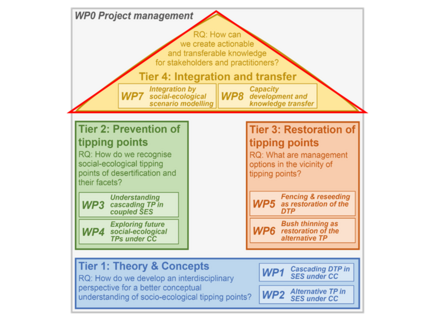Tier 4: Integration and transfer
The main objective of Tier 4 is facilitating integration and transfer addressing the research question: “How can we create actionable and transferable knowledge for stakeholders and practitioners?” – The social science research in Phase 1 showed that farmers have a detailed understanding of desertification processes. However, the stakeholders asked for more scientific knowledge on management options to prevent TPs and especially to restore their rangelands. Woody plant encroachment was an important concern on this context. To generate the needed knowledge, we will use a modelling approach to elaborate feasible management scenarios in the context of climate change. Not only new knowledge has to be generated to tackle climate change in the study region, but also extended tools of knowledge exchange to accomplish the transformation of management. Knowledge will be elaborated in exchange with stakeholders. In a dialogue process, we aim to identify knowledge needs to design specific knowledge modules, which serve as umbrellas to bring together the research results of the different WPs. Specifically tailored knowledge exchange formats, based on Phase 1 findings, will address the different stakeholder target groups.
Tier 4 (“Integration and Transfer”) includes the following WPs:
WP 7: Integration by social-ecological scenario modelling
We will use an integrated modelling approach to analyze suitable management & restoration measures regarding i) their effectiveness to prevent the tipping of, or to restore tipped rangelands, ii) their robustness under climate change and iii) their feasibility from a stakeholder (farmers and rangeland management consultants) viewpoint. For this, we will employ the eco-hydrological simulation model EcoHyD (see WP 5 of previous project phase) that has been adapted to the local case study conditions in Phase 1. The model will integrate qualitative and quantitative results of the empirical work packages and serve as a discussion tool with stakeholders.
WP 8: Capacity development and knowledge transfer to prepare for climate change
Climate change scenarios for the study region project huge challenges to maintain farming under altered climatic conditions. To understand the social-ecological processes leading to TPs and how degraded rangelands can be restored is a key knowledge to farm today and in the future. To address these challenges, we will continue and extend the transdisciplinary process with four key stakeholder groups identified in Phase 1, i.e. (i) school kids as future farmers, ii) communal and freehold farmers, iii) decision-makers (state officials, consultants, NGO representatives), and iv) academics. Capacity development and knowledge transfer have three pillars: i) academic capacity development, ii) hands-on examples at the restoration sites, and iii) long-lasting knowledge products (training materials for farmers and consultants and policy briefs for decision-makers). Project implementation partners NNFU and EduVentures will integrate the materials in their future work to guarantee the availability and updating of the contents.

